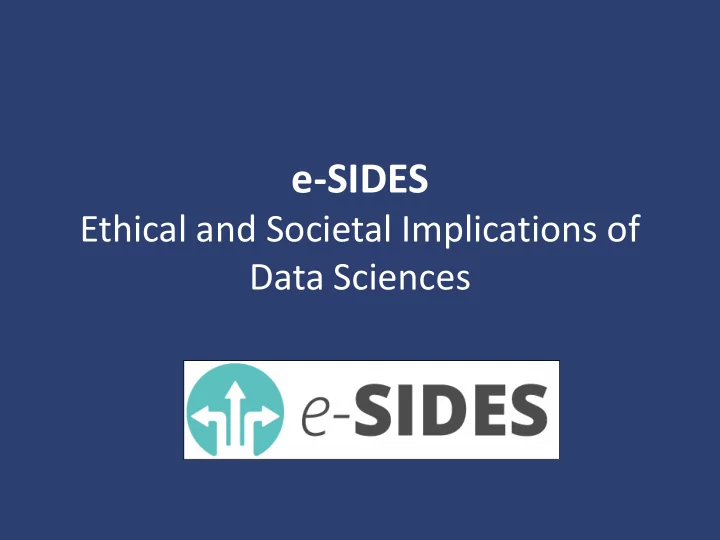

e-SIDES Ethical and Societal Implications of Data Sciences
What is e-SIDES?
• Horizon 2020 grant, running for 3 years • Three partners in consortium:
eLaw team
Planned results • 7 community events; • Final conference; • 7 white papers; • Final community position paper; • Various journal articles and international conferences presentations;
Big data: opportunities and challenges
Big data Data Datafication gathering Application Data of derived processing knowledge
‘Datafication’ • Putting different phenomena in quantified format so that they can be tabulated and analyzed; • Everything becomes data (words, interactions, emotions, habits, locations)
Applications of big data technologies - examples Predicitve decision making (for example policing, judiciary, • epidemies, natural disasters); Tailor made services (for example digital butlers, marketing) • AI based technology (for example self driving cars, robotics) •
Big data and privacy preserving technologies
Source: Data Driven Innovation OECD Oct. 2015
Priv rivacy preserv rvin ing appro pproach Priv rivacy Priv rivacy preserv rvin ing preserv rvin ing appro pproach appro pproach Source: Data Driven Innovation OECD Oct. 2015
What is the goal of e-SIDES?
Premise • Big data technologies offer very promising opportunities, but may have several negative side effects when not used properly; • Maximising the benefits of big data technologies while minimising negative side effects calls for privacy-preserving big data technologies;
Main objectives Developing a coherent assessment and validation framework • that will help the researchers and innovators to develop privacy-preserving technologies responding to the main societal, legal, ethical and economic challenges raised by big data; Promoting dialogue between data subjects and big data • communities and improving the confidence of citizens towards big data technologies;
Stages of the project
Two work streams Community Identification and building, assessment of interaction, obtaining relevant ethical and social issues feedback and opinions
Research agenda: 1. Identifying main ethical, legal, societal and economic issues in the context of big data technologies; 2. Overview of the current privacy preserving big data technologies and their implications from the point of view of four perspectives; 3. Preparing gap analysis (which issues are not yet addressed by design?) and design requirements; 4. Assessment of ethical, legal, societal and economic implications of technologies under development; 5. Determining implementation barriers, making recommendations and drafting community position paper.
Big data and challenged values: ethical framework
e-SIDES: values for big data Issues putting pressure upon values in the context of big data technologies technologies Detrimental implications can emerge in the contexts of employment, schooling or Human welfare travelling by various forms of big data-mediated unfair treatment of citizens. Big data-driven profiling practices can limit free will, free choice and be manipulative Autonomy in raising awareness about, for instance, news, culture, politics and consumption. Non-transparent data reuse in the world of big data are vast and could have diverse Non-maleficience detrimental effects for citizens. Systematic unfairness can emerge, for instance, by generating false positives during Justice preventative law enforcement practices or false negatives during biometric identification processes. For instance, in the healthcare domain patients or in the marketing domain Accountability consumers often do not know what it means and who to turn to when their data is shared via surveys for research and marketing purposes. (incl. transparency) Citizens often do not know how to tackle a big data-based calculation about them or Trustworthiness how to refute their digital profile, in case there are falsely accused, e.g.: false negatives during biometric identification, false positives during profiling practices. Their trust is then undermined. The technology operators trust at the same time lies too much in the system. Simply the myriad of correlations between personal data in big data schemes allows Privacy for easy identifiability, this can lead to many instances for privacy intrusion. For instance, when revealing too much about a user, principles of data minimization Dignity and design requirements of encryption appear to be insufficient. Adverse consequences of algorithmic profiling, such as discrimination or stigmatization also demonstrate that dignity is fragile in many contexts of big data. Big data-based calculations in which commercial interests are prioritized rather than Solidarity non-profit-led interests, are examples of situations in which solidarity is under pressure. For instance, immigrants are screened by big data-based technologies, they may not have the legal position to defend themselves from potential false accusations resulting from digital profiling which can be seen as a non-solidair treatment. Big data has rather indirect effects on the environment. But for instance, lithium Environmental welfare mining for batteries is such.
Big data and fundamental rights: legal framework
Relevant human rights ECHR EU Charter List of legal issues Art. 8 Art. 7 Right to Privacy Lack of transparency N/A Art. 8 Vagueness of the concept of Right to personal data harm and lack of individually protection attributable harm Freedom of expression Art. 10 Art. 11 Proportionality Accountability Freedom of assembly Art. 11 Art. 12 and association Establishing the adequate regulatory framework Art. 20 Right to non- Art. 14 Art. 21 discrimination The role of private actors in the context of human rights Art. 6 Art. 47 framework Right to effective Art. 13 Art. 48 remedy and fair trial N/A Art. 38 Consumer protection
Next steps
How to get informed about the results of our research @eSIDES_eu http:/ / www.e-sides.eu/
Thank you!
Recommend
More recommend